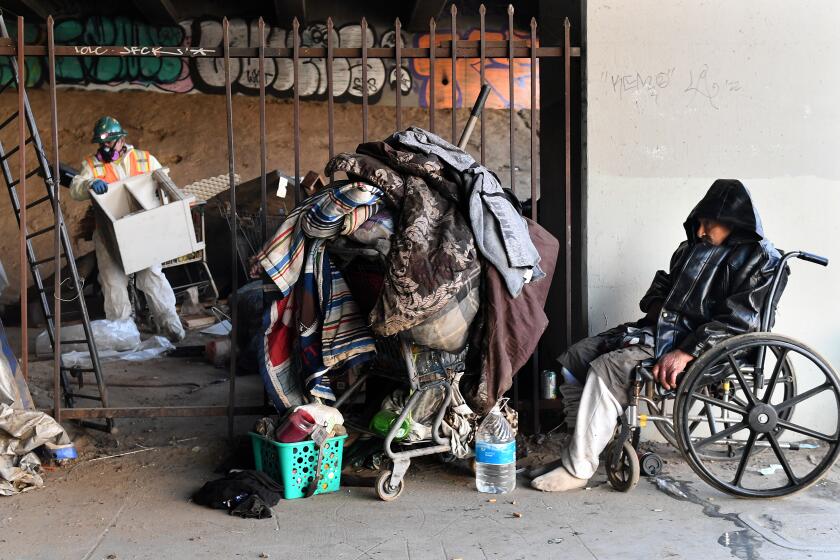His crusade to house L.A.’s poor praised by Oprah Winfrey, Garcetti. But others have doubts
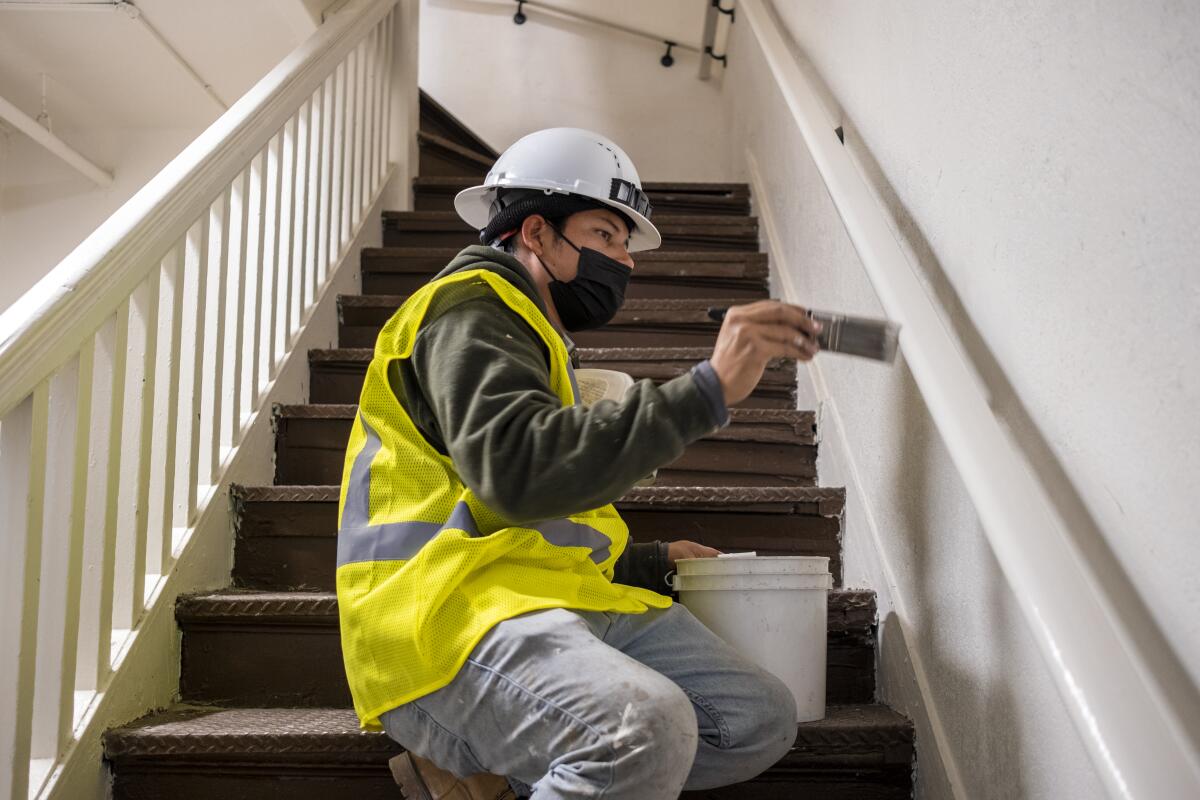
- Share via
The day that Star Owens welcomed a swarm of dignitaries and TV cameras into her new home in South Los Angeles last fall marked the debut of a bold challenge to the city’s way of building homeless housing.
The 28-unit Avalon apartments — constructed without taxpayer money in less than half the time and at less than half the cost of a typical subsidized project — would house nearly 60 formerly homeless adults and children.
For the record:
9:57 a.m. June 14, 2022An earlier version of this post referred to the tenants’ advocacy group Strategic Advocacy for a Just Economy. The correct name is Strategic Actions for a Just Economy. The story also referred to an investment by EBay’s Jeff Skoll. The investment actually came from the Skoll Foundation.
Its developer, SoLa Impact, is the brainchild of Martin Muoto, an entrepreneur who had spent nearly a decade investing in one of the most neglected parts of the city, rehabilitating distressed rental properties and, now, building new ones.
“SoLa is building right now around 1,300 units,” Muoto told admiring attendees. Almost all of those units will be affordable, he said, and a majority will have covenants requiring them to remain so for 55 years.
Muoto has won admirers such as Oprah Winfrey and Los Angeles Mayor Eric Garcetti, housing more Section 8 tenants than any other landlord in Los Angeles. But his for-profit, investor-backed model also racked up criticism from tenants’ advocates, some who vilify him as just another corporate landlord maximizing profit at the expense of tenants’ quality of life.
The dueling views reflect the conflict inherent in a for-profit company with a social mission, and what a battlefield affordable housing in Los Angeles has become for tenants and landlords alike.
Costs for Proposition HHH-funded projects continued to rise and only half the projects are set to be ready for occupancy by 2023, the audit found.
The day after the Avalon opening, the nonprofit Inner City Law Center alleged in a suit that SoLa exposed tenants in one of its buildings to “health and safety threats on a daily basis” including “long-term infestations of rats and cockroaches, severe water damage destabilizing the walls and ceilings, rampant mold” while the company’s principals “have lined their own pockets with ... rental payments by skimping on necessary repairs and regular maintenance.”
Public records show that many of SoLa’s buildings have been repeatedly cited for code violations, a fact Muoto attributes to their age and the deteriorated condition they were in when he purchased them.
“We are better than other landlords, at least the ones we bought them from — landlords who bled them for cash and didn’t put a penny into maintenance,” Muoto said. “There was an unwritten rule that if you don’t bother us, we won’t bother you. Pay when you can, but don’t expect us to really take care of the buildings.”
Muoto said SoLa has invested nearly $50 million into renovations and attributed any unresolved problems to delays caused by the COVID-19 pandemic and the inherent challenge of the company’s mission.
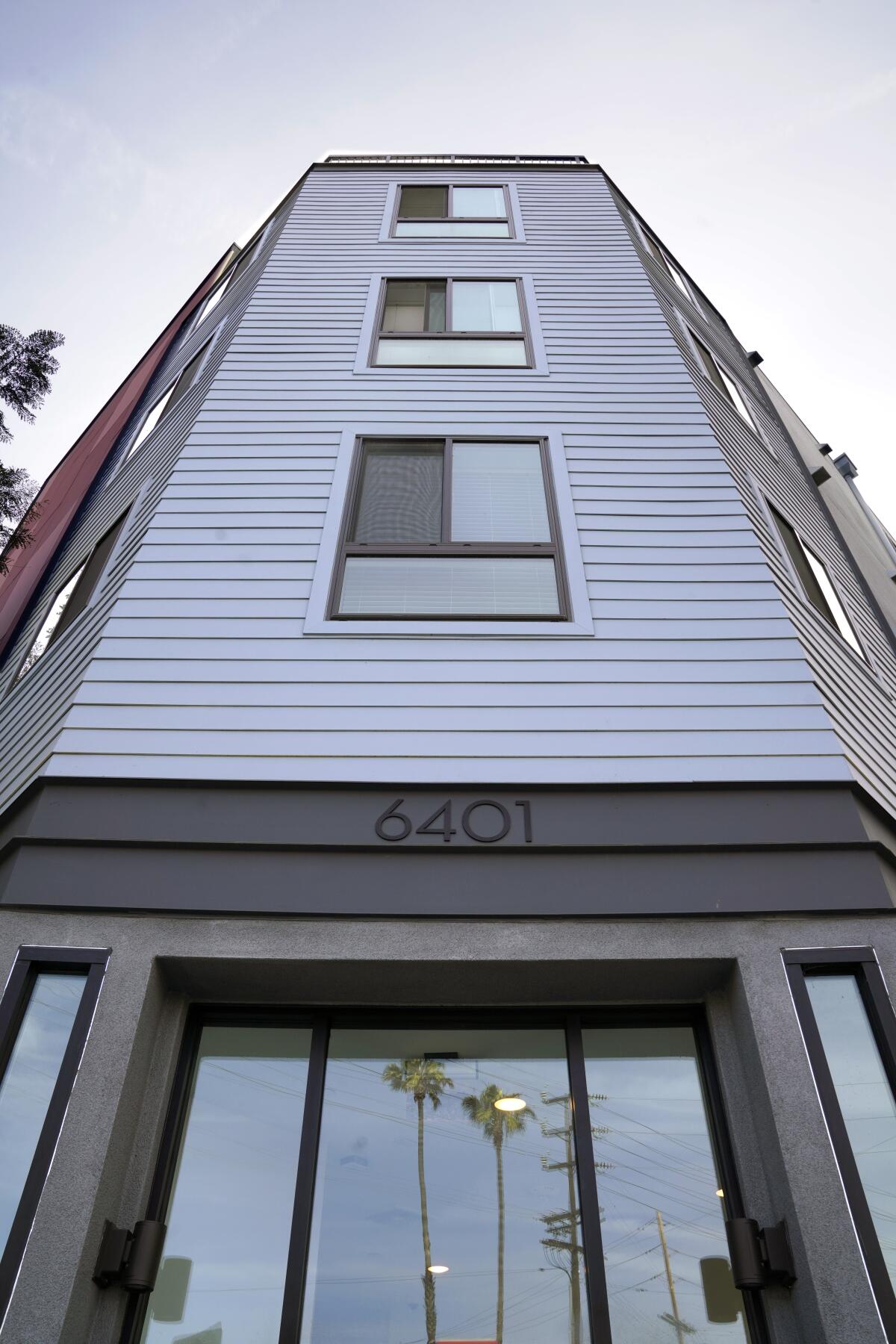
By raising hundreds of millions of dollars of what is loosely called social impact capital — put up by private investors who are willing to risk their money for a public good — SoLa funded a five-year buying spree.
“We purposely bought some of the tougher buildings to rectify them, certainly because there was an economic discount,” Muoto said. “This is not Moses leading people out of Egypt. But if we didn’t buy them, who would, right? If we didn’t invest, who would, right?”
Muoto calls his business ethos “doing well by doing good.” His evangelistic model, detailed on SoLa’s website, has won praise for attracting capital into poor Black and Latino communities generally shunned by financial markets and for pursuing a private market solution to house homeless people.
His detractors say the company has not lived up to those ideals.
“They bit off more than they could chew, and they sat on everyone they had to to get it done,” said Ve’ona Rogers, who has battled SoLa over bed bugs, mold and patio furniture at her apartment on East 60th Street. “They took advantage of poor people who couldn’t protect themselves.”
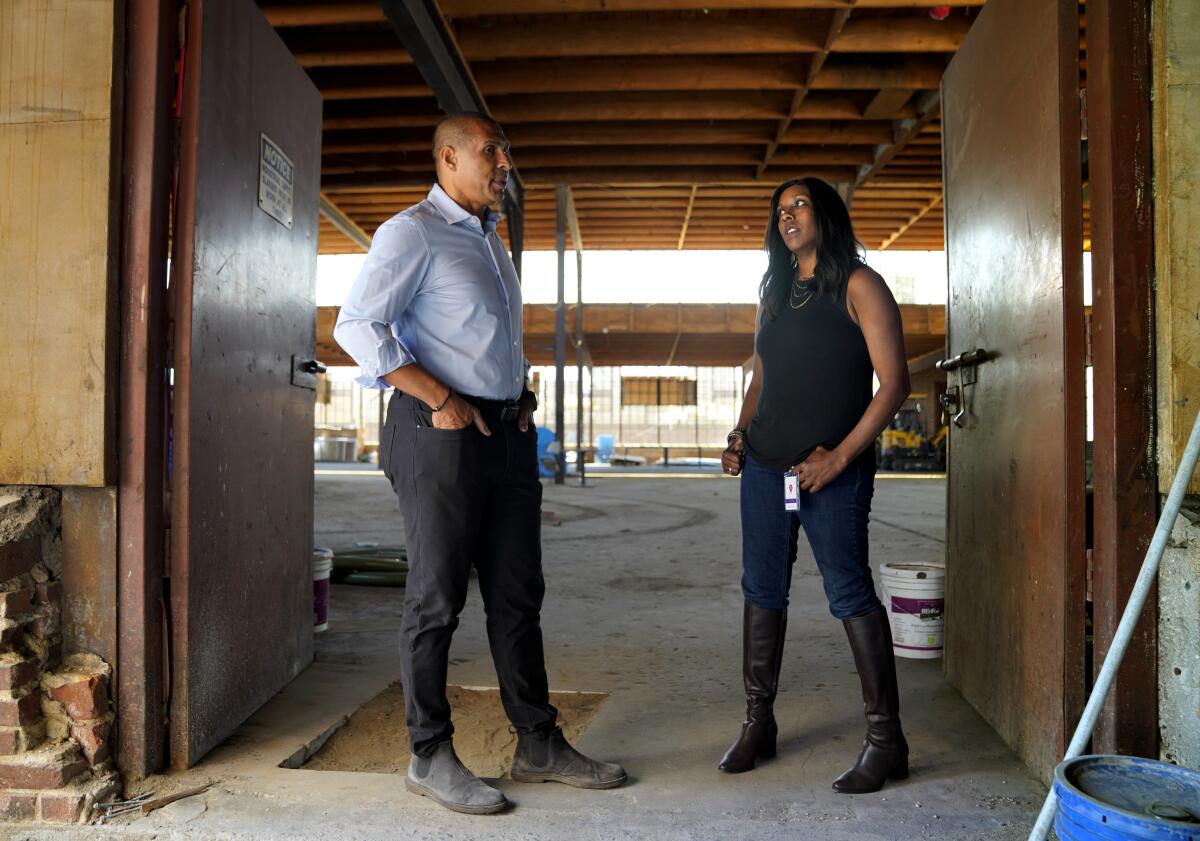
SoLa has been named in multiple lawsuits over labor relations and habitability.
“This is a 12 out of 10 on a slumlord scale,” Grant Riley of the Beverly Hills law firm Riley / Ersoff said of one SoLa building where he represents tenants. Riley’s firm has four lawsuits pending against SoLa alleging unlivable conditions.
He acknowledged that he found the company’s dual personality hard to comprehend, noting that most bad landlords keep a low profile.
“It’s a complete disconnect,” he said. “First of all, slumlords don’t have websites.”
In several interviews, Muoto acknowledged letdowns in the maintenance of SoLa’s challenging properties but dismissed his critics as ideologues who seek out disgruntled tenants to advance an anti-corporate agenda. He said SoLa has improved the housing stock of South L.A. by renovating half the units in its portfolio, spending more than $1 on rehab for every $4 in purchases.
“We bought about 150 buildings,” Muoto said. “It takes time. You can’t simultaneously rehab 150 buildings.”
Curtis Jeter recalls fearing for his future when his new landlord told him he must move from his South Los Angeles apartment because the building in the gentrifying neighborhood would no longer be for rent.
The child of a Nigerian father and Polish mother, Muoto parlayed his graduation from a Christian boarding school in rural Nigeria to a degree from the University of Pennsylvania’s Wharton School of Business. He sharpened his financial skills at national venture capital firms before turning his attention to what he believed to be undervalued real estate in South Los Angeles.
Starting in 2009, Muoto first invested his own money in several Los Angeles properties — as well as a parcel in Pacific Palisades where he built the house he lives in. He formed SoLa in 2015 and, under its banner, raised $10 million in private capital, promising investors double-digit annual returns if they were willing to wait seven to 10 years before cashing in.
While still spending that money, he raised a second fund of $55 million. The buying became frenzied: 40 properties in 2017, then 71 the next year. Leveraging the investor funds with bank loans, SoLa ultimately poured nearly $200 million into about 200 South Los Angeles properties.
In 2019, Muoto pivoted into new construction.
“We had saved and were rehabbing 1,200 units, but we hadn’t added a single unit to the inventory in Los Angeles,” Muoto said. “That bothered me, right? We’re not solving the problem.”
SoLa raised another $115 million and bought up 28 additional properties, taking advantage of the recently adopted opportunity zone law that provided generous capital gains write-offs to investors in low-income neighborhoods. Many were either vacant land or tear-downs such as the former church on Avalon Boulevard and 64th Street, where the television crews came to see the new apartment building.
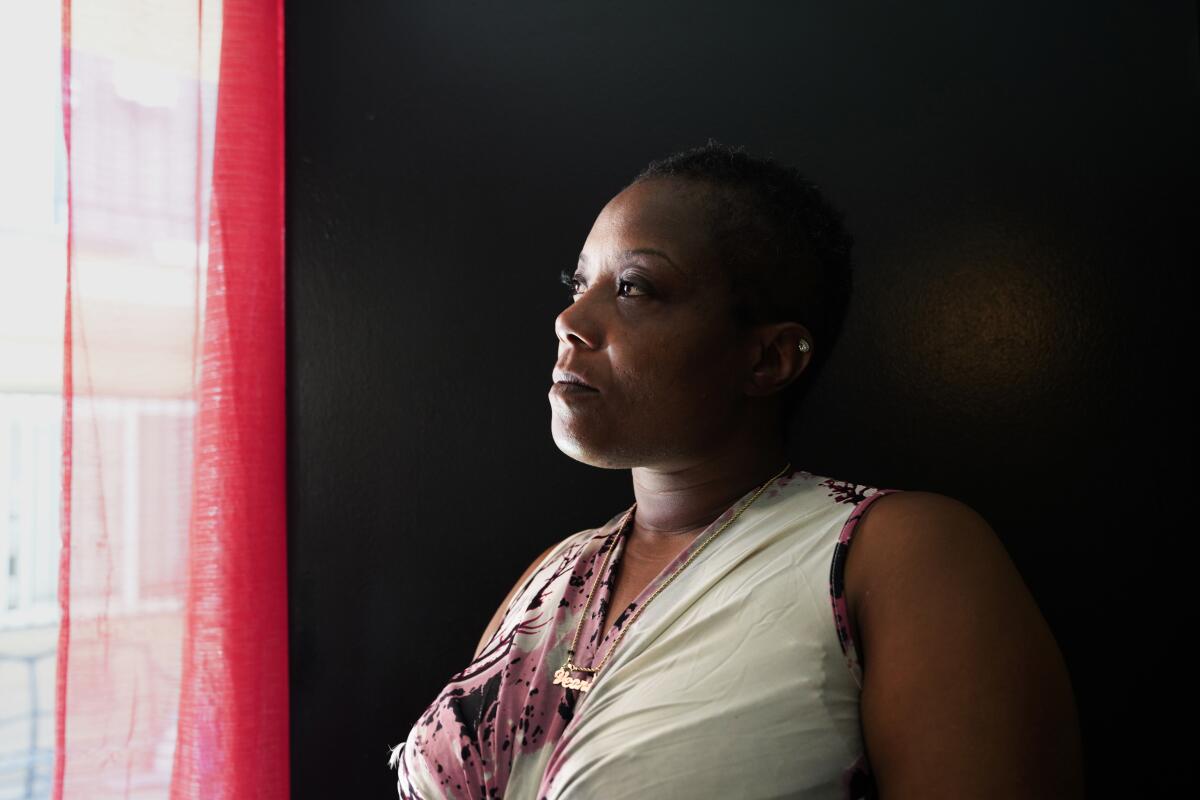
Besides the 12 projects now in construction, SoLa is working on permitting or negotiating for properties that will support an additional 1,876 units, the company’s co-founder and Chief Operating Officer Gray Lusk said.
SoLa also broadened into commercial real estate, buying a complex of derelict buildings on East 60th Street in the heart of a pre-WWII warehouse district. SoLa’s 140 employees now occupy the renovated campus of boutique offices surrounded by sophisticated landscaping. When the construction is done, the campus will be home to an art gallery, two restaurants and a Black-owned brewery.
There’s also a tech laboratory, complete with recording and live performance studios. SoLa’s nonprofit arm, the SoLa I CAN Foundation, has raised millions of dollars — most recently $2 million from the video game producer Riot Games — to provide free technology education to South Los Angeles youth and to hand out scholarships.
While many opportunity zone investors faced criticism for getting big tax breaks while putting their money in rapidly gentrifying, highly profitable neighborhoods, Muoto was winning fans for investing in truly poor ones. Forbes in 2020 picked SoLa’s fund as the nation’s best with an urban focus. And in a book castigating the abuse of opportunity zones, David Wessel, director of the Hutchins Center on Fiscal and Monetary Policy, singled out Muoto as something of a true believer in the spirit of the law.
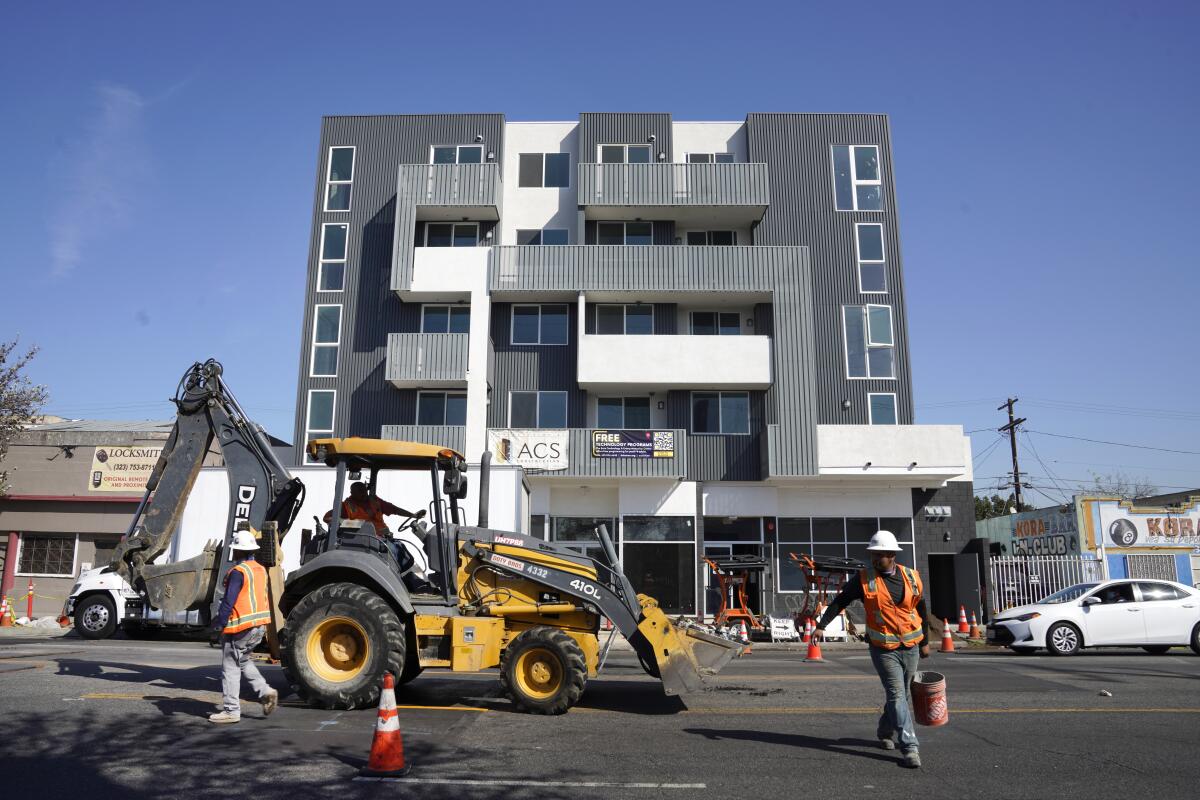
The speed and cost of SoLa’s building program contrasts with the plodding and costly progress under the city’s Proposition HHH homeless housing bond. More than halfway into the 10-year program to add more than 7,000 new units of subsidized housing, barely 1,200 have been completed, and the cost for those units has risen steadily to nearly $600,000 on average.
The 3,500 units on SoLa’s drawing boards are on a schedule to open over the next three years at an average cost of between $275,000 and $300,000, even taking into account the past two years of inflation.
With investor cash at hand, SoLa has quick access to conventional loans to get projects underway, compared with the two years or more it often takes developers to line up multiple government commitments. SoLa also avoids strings that come with that government money, most importantly requirements to pay prevailing wages and, in some cases, hire only union labor.
SoLa can choose which units to place under rent restrictions and whom to accept as tenants. Muoto has said he will keep about half the units affordable to low-income renters and most of the rest to those who earn less than 120% of the county’s median income.
Its first two new-build projects are dedicated to homeless people. HOPICS, the main homeless services agency based in South Los Angeles, has a five-year lease on the Avalon building. Another homeless services agency will occupy SoLa’s building at 92nd Street and Compton Avenue. Two other buildings scheduled to be completed in the next few weeks will be leased by an organization for homeless women and a group housing Afghan refugees.
Tenant advocates who have criticized SoLa say its private-investment strategy has inevitably led to skimping on labor and upkeep.
According to court records, in September 2020 SoLa agreed to a $520,000 settlement in a class-action lawsuit in which workers alleged that the company wilfully misclassified them as independent contractors, denied them overtime and minimum wage, failed to provide rest periods and did not produce itemized wage statements. The lawsuit estimated that as many as 600 workers were affected over a five-year period. SoLa did not admit to wrongdoing.
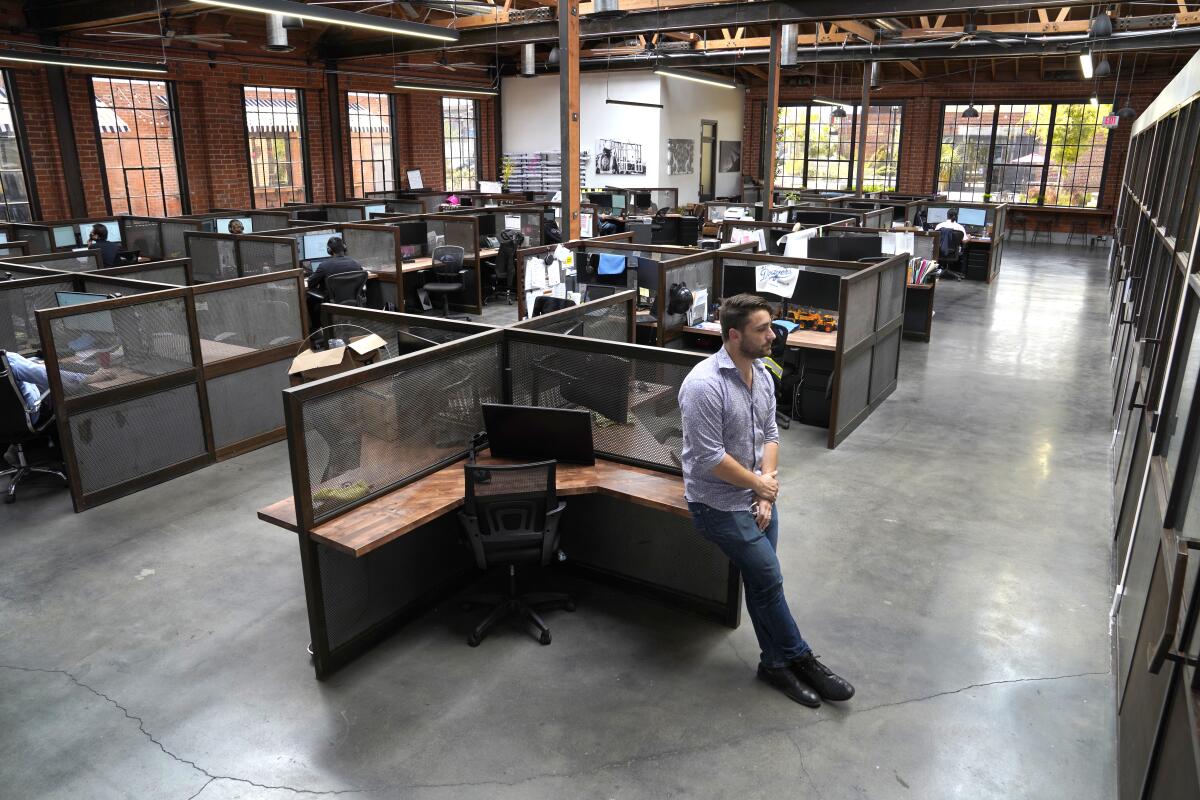
In an interview, Muoto and Lusk said the lawsuit had been a wake-up call and that they have since stopped working with independent contractors and instead work only with large, bonded general contractors.
They attributed maintenance issues to the age and decrepit condition of the buildings they purchases.
Of the 109 SoLa buildings for which Los Angeles County Assessor data list ages, more than half were built before World War II, the oldest dating to 1907.
A Times analysis of Los Angeles Housing Department records shows that, within a year before SoLa’s purchase, 64 of its buildings had tenant complaints and orders to correct code violations. Eighteen of those buildings were straddled with unresolved code violations when the property changed hands.
Those issues continued under SoLa. In the first year of SoLa ownership, orders to correct code violations were recorded at 60 buildings, and four of those cases were referred to hearings because of the slow response. Lusk attributed those delays to the city’s slow processing of building permits, especially during the pandemic.
Sharon Price, a neighbor of Rogers in the building on 60th Street, said she recently reported water seeping from under her sink and had to wait two weeks for a plumber to show up. He cleaned the drain and left, Price said, but the leaking continued. A maintenance worker then ripped up the baseboard to find a broken pipe covered in mushrooms.
Lusk provided a before photo of the repair showing a badly corroded pipe and a gaping hole in the exterior wall but no mushrooms. He said the repair was done in three days.
Disgruntled SoLa tenants, including Rogers, began showing up at community meetings organized by the tenants’ advocacy group Strategic Actions for a Just Economy.
Favian Gonzalez, the group’s assistant director of organizing, collected about 20 notice to repair complaints from several buildings and sent them to SoLa Rentals, the company’s property management arm.
“This company looks like a nonprofit, [like] they have a heart,” he said. “No, they ignored it.”
One building stood out. The 100-year-old, four-story, 29-unit apartment at 300 East Washington Blvd. had been purchased by SoLa in 2018. Three years later it was still a wreck. Layers of ancient lead-filled paint were peeling from the exterior walls, plumbing was leaking, flooring was dislodged, bed bugs were rampant, and whole sections of window casing were hanging loose.
Strategic Actions for a Just Economy turned to the Riley law firm. In May 2021, the firm filed a lawsuit on behalf of 23 tenants of the building. Two more lawsuits followed over conditions at other buildings. Among the plaintiffs was a mother of two who had video of rainwater gushing through a light fixture and a family of five in a small apartment whose ceiling collapsed on a bunk bed.
The law firm tipped off KCBS-TV Channel 2 investigative reporter David Goldstein, whose Oct. 16 report on the Washington Boulevard building featured tenants displaying baggies full of cockroaches and bed bugs interspersed with SoLa promotional videos showing Muoto touting his company’s social mission.
Three days later, the Inner City Law Center filed its lawsuit.
By late November, SoLa workers were hustling all over the building tearing out rotted framing and flooring, setting new drywall, installing plumbing and cabinets and painting inside and out.
Several tenants were moved to hotels while their units were refurbished.
Muoto has vigorously defended against the lawsuit. He characterized Strategic Actions for a Just Economy as an ideologically driven interest group. He denied that pressure to deliver promised investor returns caused the firm to short-change maintenance.
“In 2020 we did very little in terms of rehabbing,” he said. “Now, maintenance we did. But that was particularly challenging during COVID when tenants didn’t want us to come in and maintenance techs didn’t necessarily want to go inside. But we continued to do critical maintenance.”
Muoto said the public criticism has made it harder for him to raise development funds.
Investors grow leery “because of things that David Goldstein wants to sensationalize and what Grant Riley wants to profit from,” he said.
Muoto points to SoLa’s record of making housing available for poor people who hold Section 8 federal rental subsidies, resulting in a decrease in the average income of SoLa tenants. Resistance to subsidized tenants has been a chronic obstacle to finding suitable homes for poor and homeless people.
About half the 650 new leases SoLa has signed hold Section 8 vouchers, Lusk said.
SoLa’s critics contend that the company is selectively rehabbing units after pressuring tenants to leave so that it can raise rents beyond the 3% or 4% increases allowed under the rent stabilization ordinance. Section 8 rents, based on federal guidelines, can be much higher than long-term tenants in rent-controlled buildings pay.
Muoto denied that SoLa pressures, or pays, tenants to leave. The Los Angeles Housing Department, which requires landlords to file reports when they pay tenants to vacate, has no record that SoLa has used that practice.
But Housing Department records obtained by The Times through public records requests show a pattern of aggressive rent increases by SoLa. In 155 buildings subject to rent control, rents for about a third of units have been increased more than the annual limit — allowable only when a tenant vacates — and those increases in many cases were more than 50%.
SoLa said the Housing Department data were grossly inaccurate, but a check of one building confirmed that six of 16 units has been raised between 57% and 92% after tenants left. All those tenants left voluntarily with unpaid rent up to $10,000 that SoLa did not collect, Lusk said.
For all its controversy, support for SoLa has not wavered. In February, it announced a $50-million commitment from the California State Teachers’ Retirement System to its latest enterprise, the Black Impact Fund that has so far raised $270 million from investors including PayPal Holdings, Adirondack Capital and the Skoll Foundation. The money will fund another 3,500 units, Lusk said.
“SoLa’s model has demonstrated that a high-caliber operator with a disciplined investing approach, combined with intentional social impacts, can deliver returns that benefit investors and community members alike,” Julie Donegan, a portfolio manager for CalSTRS’ real estate team, said in announcing the decision.
The Black Impact fund will continue SoLa’s shift to new construction, Muoto said. About 90% of it will go into new affordable housing in South LA.
Muoto said the controversy has caused him to stop buying older buildings, but SoLa has no plan to divest its aging housing portfolio.
Muoto recoiled at a critic’s suggestion that the 100-year-old building on Washington Boulevard wasn’t worth saving.
“We’re not going to take away naturally occurring affordable housing regardless of what Grant Riley wants us to do,” he said.
More to Read
Sign up for Essential California
The most important California stories and recommendations in your inbox every morning.
You may occasionally receive promotional content from the Los Angeles Times.
